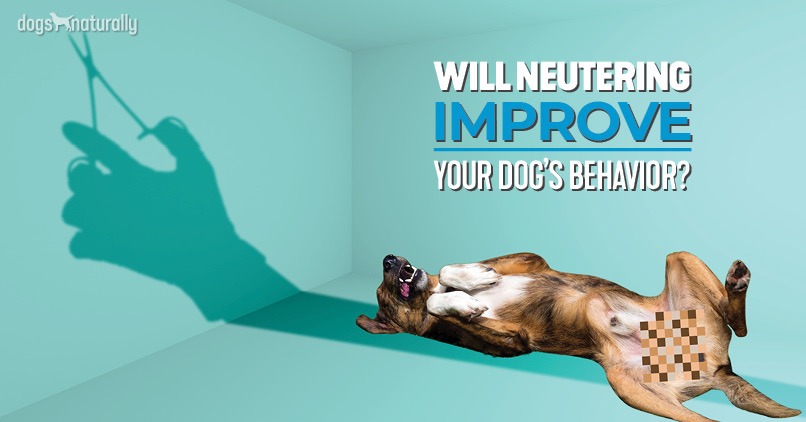Most pet owners have undoubtedly heard the following statement at some point in their lives: Fixing your dog will make him less aggressive.
It’s an idea so often restated – even by veterinarians – that many of us accept it as undeniable fact.
But is it? Does neutering help with aggression?
Some recent studies say no.
In fact, a new study released earlier this year found mostly negative behaviors in neutered male dogs.
Neutering Can Make Behavior Worse
According to Dr Stanley Coren, professor of psychology at the University of British Columbia:
“As in previous studies, the new data clearly shows that the positive behavioral effects which were expected from neutering did not occur, and if anything, the behaviors of neutered male dogs tended to be considerably less desirable… Of the 100 behaviors assessed, 40 showed statistically significant differences between the castrated and intact dogs. Only four of these behaviors showed a more positive outcome as a result of neutering.”
Some of the negative behaviors found in neutered male dogs in the study included:
- Rather than reduced aggression, the neutered male dogs in the study were found more likely to show aggression when strangers such as delivery workers were near the home, when the dog was approached by an unknown female dog and when small animals entered the yard.
- The study also found that the behaviors were worse in dogs that were neutered earlier.
- The neutered dogs also demonstrated more fear-based behaviors like reactions to loud noises and new situations.
- Intact dogs were less likely to eat feces – either their own or another dog’s. They were also less likely to roll in feces or other smelly things.
- Intact dogs were also less likely to bark persistently when they became alarmed.
- Intact dogs were less likely to mount objects, furniture or people.
- Intact dogs were also less likely to chase animals.
“The pattern of these results is quite clear: Neutering male dogs causes an increase in aggressive behavior, fearful behavior, over-excitability and a variety of other miscellaneous, undesirable behaviors,” wrote Coren. “What is also clear is that early neutering produces an even greater negative effect on behaviors.”
Are There Any Behavioral Benefits to Neutering?
According to the study, there were a few:
- Intact dogs were more likely to howl when left alone than neutered dogs.
- Intact dogs were more likely to mark indoors.
- Intact dogs were less likely to return immediately when called while off-leash.
- Intact dogs were less likely to fetch.
RELATED: Do you even need to spay or neuter your dog? Society may say yes, but you shouldn’t always listen.
Why The Need To Neuter?
According to the study, “The beneficial effects of gonadectomy are underpinned by the need to reduce the number of unwanted companion animals.”
And we’ve heard this before. It’s not a secret that thousands of dogs are euthanized because of over-crowding in shelters. Rescue organizations across the world work hard to find these dogs home, but not all are lucky enough to find one.
The problem is, many of those dogs are surrendered to shelters because of undesirable behaviors such as aggression. These dogs end up in the shelter and the push for neutering continues.
The current study highlights this issue. The long-held belief that neutering will help curb aggression coupled with the need to reduce the number of unwanted dogs means people are quick to head to the vet for this procedure. This, the study suggests, can actually increase the problem, in turn making them more vulnerable to ending up in a shelter.
And That Isn’t All
There’s another study (The Social Behaviour of Neutered Male Dogs Compared to Intact Dogs (Canis lupus familiaris): Video Analyses, Questionnaires and Case Studies) that found more examples of anxious behaviors in neutered dogs compared to intact dogs. The study also found that owners of intact dogs who were surveyed reported higher scores for “boldness” and “sociability to dogs.”
Once again, neutered dogs were found to be easier to train, according to the surveyed owners.
According to the researchers:
“The knowledge to be gained is very important for present and future dog owners as well as veterinarians with particular reference to the fact that neutering of dogs has become part of ‘responsible ownership’ in many countries, which according to our results might not be so responsible at all, at least not in all cases. Understanding long-term effects of the procedure on dog [behavior] will be essential for deciding whether or not to neuter a dog, especially since it is often done not to prevent breeding but precisely to change [behavioral] aspects of a pet. Even now we could go so far as to advise dog owners against neutering with the intent to correct undesired habits because the lack of verifiable difference in and of itself is enough to question the justifiability of such a drastic intervention, at least until more information can be provided on the [behavioral] changes induced by gonadectomy.”
We have long supported the need to, at the very least, wait until a dog has fully matured before choosing to spay or neuter. There is a lot of research that supports the health benefits of this approach. Now, thanks to these new studies, we can see there may be behavioral benefits as well.













